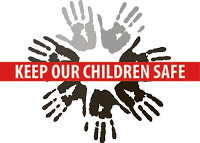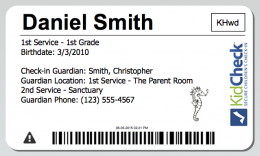Keeping Your Kids Safe

This week we’re featuring a guest post written by Russ Sharrock from Integrated Security Consulting. Russ is the Executive Director at Vanguard Ministries International, an experienced Pastor and Security Consultant with a strong background in surveillance, leadership, and human resources.
Click here for the original post.
Most churches take child safety very seriously. This is why so many churches use criminal background checks, personal references and an intense interview process. It is also why churches use the Two Adult Policy where a child must be in the line of sight of two unrelated adults at all times. These policies are excellent at keeping a predator from being alone with a child. But with all your efforts, there is only one thing you must remember:
All a predator has to do is outlast you.
Your children’s ministry can and should be fun and engaging, and you can have plenty of volunteers and exciting events, but the number one concern for parents is the safety of their most prized possessions while they’re in your care. Earning parents’ trust by having high-security standards is vital to keeping families engaged.
No matter how many policies you put in place, if they are confusing, riddled with exceptions and too easy to forget, a moment will come when your defenses are down. Everyone working in the church with children, whether in the nursery, Sunday school or youth group, should undergo a background check. This seems like common sense, but you’d be amazed at how many churches do not require full background/criminal checks for their children’s ministry volunteers.
Any parishioner with a history of sexual crimes should not have access to children. Church boards should make decisions about parishioners with a criminal history on a case-by-case basis. However, it’s also important to remember that, according to GuideOne Insurance, 90 percent of sexual abuse cases are never reported. A clean record alone isn’t a guarantee that a person won’t abuse a child. It’s also prudent to allow volunteers to work with children only after attending the church for at least six months
Churches should enforce a two-adult rule, meaning that an adult should not be in a room with a child or children without another adult present. In the nursery, two adults should be present at all times. In Sunday school, one adult can teach a class, but other teachers should be within earshot in other classes. Youth group leaders should never spend time with students without another adult present. Having two adults not only keeps the opportunity for abuse low, but also gives the adults the opportunity to observe the other person’s behavior with the children. Any adult who has concerns about another adult’s interactions should report it promptly to the proper church authorities.
Infants and young children left in the nursery should be signed in and out by a parent or a previously approved adult.
CHILD CHECK-IN AND CHECK-OUT
Check-In:
1) Register child in system
2) Print 2 tags/stickers and affix to Child and Parent
3) Check child into room
Check-Out:
1) Match parent tag with child tag upon Exit.
Pretty Simple, Right? Not so fast. What if you have to evacuate in the middle of the service? How will you reconcile all of the children to their parents? Did you make a list/log of the children as they entered the room that you could take with you outside in an evacuation? (Check-In: step 3)
Here’s a pretty cool addition to a sticker system I saw implemented at one church. Instead of printing just TWO stickers; print THREE. Use the third sticker to stick on a classroom Log Book. Initial beside each sticker as the child is matched with the parent at the classroom door for checkout. If there is an emergency, take the log book/sheets with you. This is a list of children in the room and a way to check them out after the evacuation.
A parent should not be allowed to retrieve a child for another parent. Volunteers should sanitize all equipment after each use to prevent transmitting illnesses. All cribs and playpens should meet current safety standards. Churches should formulate emergency and fire evacuation plans and ensure that all workers know the locations of exits, fire extinguishers and smoke detectors.
Churches that own buses should allow only adults older than 25 years of age with an appropriate license to drive the bus. A second adult should ride on the bus to keep horseplay and other distractions to a minimum. For transportation in private cars, parents should sign waivers allowing transport and treatment in case of an accident. Teens should not drive other teens in private vehicles on youth group trips. Each child must have a seat belt and use it. For trips to remote areas, adults should carry cell phones and first aid kits, and know CPR and basic first aid procedures.
Growing up, I made some pretty stupid mistakes. I didn’t get in trouble often, but when I did, it was usually when I did something without thinking first. My parents would often end the discussion with, “God gave you a brain, use it!”
Oddly enough, this advice applies here. Begin now to create a plan, not only for prevention of serious security issues, but also for any kind of security breaches that could happen. What actions would need to be taken if __ happened? Start to design clear prevention strategies and easy to follow action steps in case something happens. Make sure this plan is posted where your children’s ministry team can access it whenever they need it.
Once you establish policies and procedures, don’t depend on them. These guides are simply that, they help keep things on track, but they don’t completely prevent an issue from arising. Always be alert to who is in the kids’ area and why they’re there. Develop a team of people who think like you and can help find these weak spots.
There will always be pressure to have more volunteers. One thing I’ve learned, however, is the more training and knowledge a volunteer has about their role in ministry, the longer they stay involved. Teach your team about your procedures for keeping kids safe. Be clear as to why you do what you do so that there is an understanding and a purpose behind the policies you set up for the ministry. Developing a team of consistent children’s ministry volunteers that understand the policies and procedures ensures that your kids are in good hands.
A way to show a church’s commitment to preventing child sex abuse is regular monitoring and supervision of staff and volunteers who work in student and child serving programs. It’s important to continually review policies and do unscheduled drop-ins. By doing this you’re communicating to parents that you didn’t just wind this up and let it go, you’re supervising it, monitoring it, and having regular interaction and oversight of your child-serving programs when parents can walk through the halls of your building and can see this.
Finally, Risk & Vulnerability Assessments are critical as a first step in developing any security program. Law enforcement and insurance agencies both perform them without charge. It’s a good idea to continually look over your assessment and be willing to modify as needed. I also strongly suggest you do a new assessment annually to record progress and make certain nothing has slipped.
What are some steps you can take to improve the security of your Children’s Ministry?
Be Safe!
Russ Sharrock


